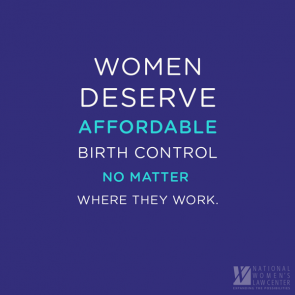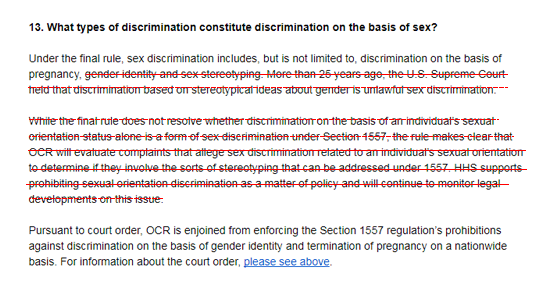Women Deserve Birth Control Coverage No Matter Where They Work
Last Wednesday, the National Women’s Law Center filed an amicus brief in the Supreme Court along with 68 other organizations in Zubik v. Burwell. In Zubik, certain employers and schools with religious objections to birth control are challenging the accommodation that allows them to exclude birth control coverage from their insurance plan if they have religious objections to it. Under the accommodation, the women get the coverage separately from the insurance company. Even though they don’t have to include the coverage in their plan, some employers and schools are objecting to the accommodation because the women get the separate coverage.

At stake for women in this case is whether they can access essential birth control coverage from their regular insurance company or instead will be forced to navigate economic and other barriers to obtain that coverage elsewhere. We submitted an amicus brief explaining why those stakes are so just high for women.
Our own brief makes the case that birth control is central to women’s health, economic security, and equality. We also explain in detail, from the woman’s perspective, why the “proposals” suggested as alternatives to the accommodation would not effectively advance the Government’s interests. Instead the alternatives would make it more difficult for women to access the coverage or would leave them without coverage at all. That certainly doesn’t advance the Government’s interests.
Our brief was among the dozens of amicus briefs filed in support of the birth control benefit. These briefs touch on a broad range of issues and from various perspectives. Together, the briefs make the convincing case that the Supreme Court should reject the employers’ and schools’ claims.
For example, organizations that represent health care providers weighed in to explain why contraception is so critical to women’s health, and how this care is best provided within an established patient-provider relationship. The American Academy of Pediatrics wrote separately to emphasize how this case could lead to obstruction of life-saving health care—i.e. vaccinations—for children.
Many organizations representing a broad range of faiths, including the Baptist Joint Committee, the National Coalition of American Nuns, Catholics for Choice, Anti-Defamation League, the Union for Reform Judaism, Hindu American Foundation, weighed in supporting the birth control benefit.
Compassion & Choices wrote about how this brief could undermine healthcare decisions or advance directives, such as a do-not-resuscitate order or refusal of a ventilator or feeding tube. Many church-state and religious liberty legal scholars weighed in, carefully explaining why the accommodation must be upheld under longstanding legal principles.
There are briefs that assess these challenges against a historical backdrop, including how courts previously rejected efforts to use religion to discriminate and comparing the birth control accommodation to conscientious objector laws.
Social scientists and health policy experts weighed in, using their expertise to explain why the birth control benefit advances the Government’s compelling interest in public health and why the challengers’ proposed alternatives to the accommodation failed to pass the sniff test.
Members of Congress who voted for the Affordable Care Act weighed in, noting that the birth control benefit effectuated Congress’ intent in promoting public health.
Briefs were written about the dangerous impact this case could have on LGBT individuals’ health and rights. There is a brief that explains how the exemption the employers and schools seek would disproportionately harm reproductive justice communities.
Americans United for Separation of Church and State submitted on behalf of 240 students, faculty, and staff at religiously affiliated universities that talks about how their rights and health would be negatively impacted by this case.
Overall, the amicus briefs offer the many reasons why these challenges to the accommodation in the birth control benefit are so dangerous to women, to public health, to religious liberty, to established legal principles, and to our country’s wellbeing.
Together, these amicus briefs bring a broad range of voices and points to the Court’s attention, providing further support to the Government’s overwhelmingly strong case and highlighting just how high the stakes really are in this case.




